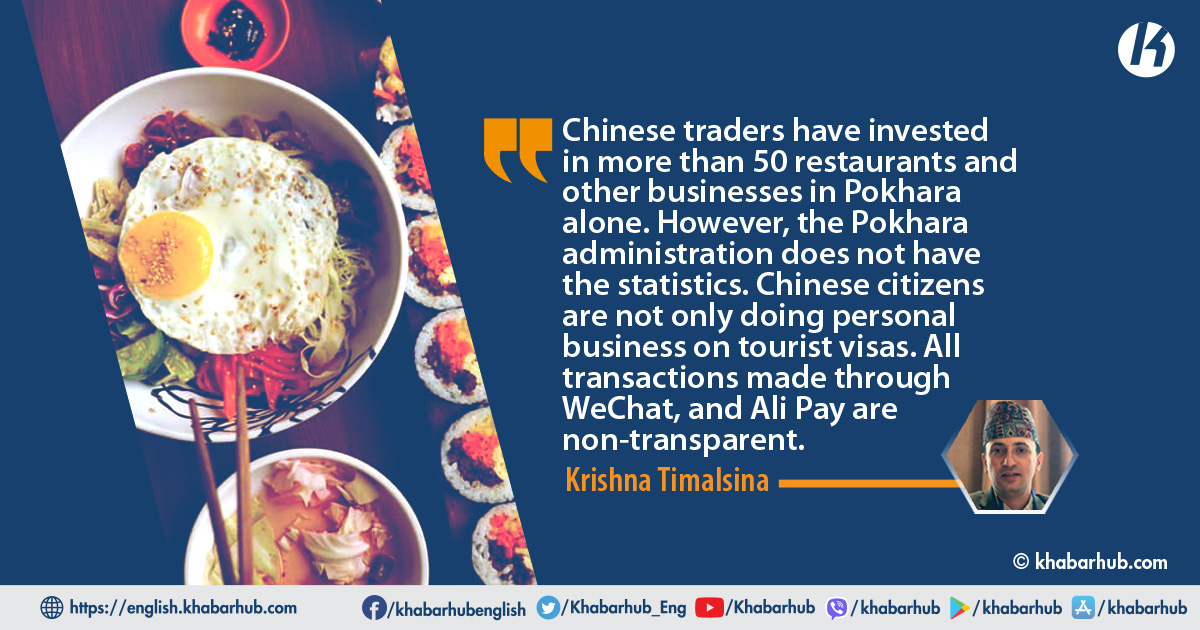KATHMANDU: Coronavirus pandemic devastated Nepal’s hotel and tourism sector the most. However, Chinese investors seem more attracted to this sector than others.
It is doubtful that Chinese investment will increase through small projects in areas where there is little potential in Nepal. Nepal should be aware of this in time. Their mysterious involvement makes one doubtful about their intentions.
Tourism businessmen admit that the number of Chinese tourists is on the rising trend than the Indians. They say the share of Chinese tourists in Nepal is now over 15 percent.
Aiming at them, Chinese businessmen have invested in more than 400 hotels and restaurants in tourist hubs including Kathmandu, Lalitpur, Bhaktapur, Kaski, and Chitwan.
Chinese traders have invested in more than 50 restaurants and other businesses in Pokhara alone. However, the Pokhara administration does not have the statistics. Chinese citizens are not only doing personal business on tourist visas. All transactions made through WeChat, and Ali Pay are not transparent.
Apart from the Kathmandu Valley, Chinese nationals who have entered Nepal as tourists or as investors have started to lodge foreign tourists in Chitwan and Lumbini by investing in lodges and private houses, apartments, and flats, without seeking due permission from the tourism department.
In 2020/21, the foreign investment commitment in the tourism sector was Rs. 11.66 billion, while the Chinese investment commitment was Rs. 10.17 billion. This is 91.89 percent of the total investment commitment in this sector.
The Chinese companies, which are not registered with any authority and have not taken any tax liability, have been providing not only hotel booking services but also keeping tourists at home, apartments and flats. This is related to tax evasion.
Hotel Association of Nepal (HAN) officials complain that the Chinese trend of doing business in Nepal without paying taxes to the government and making payments through an online system by booking the desired rooms has added to the problems of the tourism industry.
The hotel business has been the victim of unhealthy competition. However, according to the Tourism Act, guest houses such as hotels and lodges must obtain permission from the Department of Tourism to accommodate foreign tourists and trade in foreign currency.
Increased investment: zero return
Looking at the statistics of the Department of Industry for the last five years, the largest share in the hotel and tourism sector is Chinese.
In the Fiscal Year 2015/16, the total investment commitment in the tourism sector was Rs 1.94 billion. The Chinese investment commitment was Rs 1.8 billion.
In the Fiscal Year 2016/17, the investment commitment in the tourism sector reached Rs 5.98 billion and Chinese investment commitment came to Rs 2.93 billion.
Chinese businessmen who have invested hundreds of rupees in Nepal have been bringing the main manpower working in the hotel and tourism sector from their homeland. Nepalis have neither got employment opportunities nor any contribution to Nepal’s economy through Chinese investment.
Similarly, in the Fiscal Year 2017/18, out of the total investment commitment of Rs 4.15 billion in the tourism sector, China committed to invest Rs 2.10 billion.
In the year 2018/19 the investment commitment reached Rs 10.53 billion out of which the Chinese side promised to invest Rs 6.42 billion.
Likewise, the Fiscal Year 2019/20 saw the tourism sector investment commitment of Rs 11.66 billion whereas the share of China reached Rs. 6.42 billion.
In 2020/21, the foreign investment commitment in the tourism sector was Rs. 11.66 billion, while the Chinese investment commitment was Rs. 10.17 billion. This is 91.89 percent of the total investment commitment in this sector.
According to the Department of Industry, the attraction of Chinese investors in the hotel tourism industry has also increased during the review period of the current fiscal year. According to the department, the tourism sector has got more than Rs 25 billion in investment from China in the last five years.
The flights from China to Nepal have been almost closed and no tourists have entered the country by land in the last one and half years.
However, Chinese tourism entrepreneurs seem to be stuck in this area. As Chinese investors are more focused on tax evasion, their contribution to the country’s economy is minimal.
Foreign exchange depreciation is high
After a tourism entrepreneur complained that Chinese tourists visiting Nepal only transact online through the online payment service system WeChat Pay and Ali Pay, the Nepal Rastra Bank (NRB) declared such payment system illegal three years ago.
However, the Chinese are still taking advantage of weaknesses in Nepal’s electronic payment system. The ‘billing software’ used by tourists in Nepal on tourist visas is still not under the control of the Nepali government.
Since the majority of Chinese businessmen are not connected to the billing software recognized by the Inland Revenue Department of Nepal, their transactions are not visible in Nepal’s payment system.
Nobody from the Nepali government has yet collected the exact details of the billing software issued by the Chinese businessman as the Chinese tourists are still paying from WeChat Pay and Alipay. Even NRB has not been able to stop the misappropriation of foreign exchange through these systems.
Pokhara is now the main destination for Chinese tourists. The Chinese, who are still in business, still do most of their economic transactions through this system.
There is a huge investment in Chinese hotels and restaurants and fancy shops in Pokhara. Tourists visiting Nepal from China come in contact with Chinese businessmen directly through online booking.
Money transactions are done through Chinese software WeChat, and AliPay. The record of this transaction is not seen in any trading system in Nepal.
The money spent by tourists is deposited directly from the Chinese bank account into the businessman’s bank account.
Police raided the arena after receiving information that illegal loans were flowing to India from foreign nationals. It was confirmed that 36 Chinese youths in Kathmandu and 80 youths in Bhaktapur were involved in the same illegal business by renting houses in Kathmandu and Bhaktapur.
Chinese businessmen who have invested hundreds of rupees in Nepal have been bringing the main manpower working in the hotel and tourism sector from their homeland. Nepalis have neither got employment opportunities nor any contribution to Nepal’s economy through Chinese investment.
This illegal business is having a big impact on the tourism business and Nepal’s economy. Trade tax, VAT, labor problem, all hassle-free business is possible in Nepal, and Chinese investment in this sector has become more attractive.
The Nepal Rastra Bank (NRB) has said that it is illegal to make payments using POS machines, QR code scanners and other methods associated with foreign payment service providers.
That is to say, Kashmiri has been linked to this online payment system by Chinese banks and businessmen and Chinese businessmen who have been making a huge contribution to Nepal’s tourism industry for years and have been misappropriating foreign exchange.
It is illegal to make such payments from companies or systems other than those permitted in Nepal. However, business firms opened by Chinese investors are still showing very few transactions in Nepal through licensed apps.
Two years ago, after the Nepal Rastra Bank (NRB) warned the Chinese payment channels Alipay and WeChat not to come under the purview of law or to transact through such channels; the Chinese government put pressure on them to lift the ban immediately.
Business firms opened by Chinese investors are still showing very few transactions in Nepal through licensed apps.
The then commercial consul of the Chinese embassy in Nepal, Zhang Fan, had objected to Nepal’s blocking of Chinese payment service providers.
However, embassy officials never discussed with the Nepalese government how to use the service legally when Chinese tourists stay in Nepal. The subject calmed down again. Services are illegal in Nepal except for the Chinese payment service provider Union Pay.
However, hundreds of Chinese businessmen who have invested in hotels, restaurants and travel agencies have not stopped sending the money earned in Nepal directly to their country without meeting the mandatory legal process.
However, according to Nepal’s legal provisions, permission must be obtained to operate any payment service in Nepal.
There is a legal provision to get permission from Nepal Rastra Bank if one wants to make payment through the internet. Chinese businessmen are even tearing it apart.
Alipay, WeChat and others, which are also providing foreign currency payment services without permission, have also attracted Nepali consumers. Of late, business people have started importing goods from China paying online through WeChat.
Entrepreneur’s covert business
In the second week of last March, the police arrested some Chinese people who were running meter businesses (providing loans at high interest) in Nepal as tourism entrepreneurs and tourists.
Chang Hu Bao and Wang Jinao, two Chinese operating such business, were arrested recently from Sanothimi, Bhaktapur.
They had been staying in Nepal on a tourist visa for three months and were involved in illegally disbursing loans to Indian nationals.
Nepali service providers and the government do not have information on the price at which tourists have bought accommodation, so hoteliers in Nepal have started joining ARBNB to increase hotel bookings.
The gang was very big at lending to Indian citizens at high-interest rates from unregistered mobile apps like Easy Credit, Free Cash, Handy Loan, Go Loan, Rupee Star, and High Cash.
Police raided the arena after receiving information that illegal loans were flowing to India from foreign nationals. It was confirmed that 36 Chinese youths in Kathmandu and 80 youths in Bhaktapur were involved in the same illegal business by renting houses in Kathmandu and Bhaktapur.
They used to get in touch with Indian citizens through the app, and make them fill out a form online saying they (the Indians) will be given a loan.
They used to take photos, ration cards, and contact numbers and provide loans of up to Rs 30,000 for seven days through the app.
They (the Chinese group) had already made millions of rupees by threatening to make the photo and ration card viral on social media if the Indians failed to pay the loan and interest in time.
After arresting the same group, the police raided some Chinese nationals for running gambling, boogie, waiting and other games through apps in cities including Kathmandu, Pokhara, Biratnagar, Birgunj, Butwal and Bharatpur Chitwan.
According to the police, as the victim Indian nationals involved in this business do not come to Nepal to the complaint, the Chinese continue their criminal activities.
In December 2019, the Central Investigation Bureau (CIB) of Nepal Police and the Metropolitan Police Complex Teku arrested 122 Chinese nationals from Kathmandu on the same day.
The Chinese nationals, who lived in Nepal and worked in areas such as hotels and information technology, arrested in the joint special operation were involved in cybercrime activities and assisted in the illegal economic activities of Chinese businessmen from Nepal.
Earlier, a similar group of Chinese hackers, who hacked the ATMs of various banks in Kathmandu and stole millions of rupees, was arrested by the police in August 2019.
Illegal payment network
There are many such payment providers that are not connected to any system that shows Nepal’s economic activity. Apart from Chinese apps, the US agent company ARBNB has also become a challenge for Nepali businessmen in the tourism sector.
ARBNB sells houses/flats/hotels at fixed prices to people connected to its online system looking for hotels. Nepalis who want to give their home to foreign tourists are now registering with ARBNB by mentioning the services and facilities they can provide.
The company pays home and hotel owners online as per the agreement. Prior to the coronavirus epidemic, the US online company used to sell up to 4,000 rooms a day in the Kathmandu Valley.
Most of the tourism entrepreneurs are paying the government through unofficial means without paying taxes, even though hundi or credit cards of their relatives abroad.
However, to date, no ARBNB business has been registered in Nepal. Like the Chinese, the house / flat / hotelier or company involved in the transaction through this company is out of the scope of the tax.
The government has lost the revenue it deserves. The practice of providing illegal housing services has put those doing business legally in crisis.
Nepali service providers and the government do not have information on the price at which tourists have bought accommodation, so hoteliers in Nepal have started joining ARBNB to increase hotel bookings.
Like China and the US, the Indian company OYO has also expanded its illegal services in Nepal’s tourism industry. Bimalendra Nidhi, the then Deputy Prime Minister and Home Minister, inaugurated the Nepal branch of OYO, a destination for Indian tourists, standing with the then Indian Ambassador Manjib Singh Puri without considering the impacts of opening such a company.
Nepal’s tourism entrepreneurs say it is still doing online transactions skipping the legal channels. Headquartered in Amsterdam, the Netherlands, it connects tourists from 70 countries to the online payment system.
About 700 hotels in Kathmandu Valley are connected to this system but the company is not registered in Nepal.
Booking.com is running from Sri Lanka and India. 10 to 20 percent of the transaction amount is taken by the commission booking.com.
Even the tourism department has not been able to monitor the matter. Although not registered in Nepal, another company called Expedia is also involved in online payment transactions in Nepal’s tourism sector.
India’s Make My Trip, and Singapore’s Agoda are also out of the tax range like online payment service providers like WeChat and Ali-Pay.
Most of the tourism entrepreneurs are paying the government through unofficial means without paying taxes, even though hundi or credit cards of their relatives abroad.
They have been sending money through informal channels under the heading of business promotion expenses.









Comment